Honda HR-V vs Hyundai i20 – Which model is better for everyday use?
Everyday use, family trips or long-distance drives – here’s where the differences show.
Discover whether Honda HR-V or Hyundai i20 fits your lifestyle better.
Costs and Efficiency:
Price and efficiency are often the first things buyers look at. Here it becomes clear which model has the long-term edge – whether at the pump, the plug, or in purchase price.
Hyundai i20 has a clearly advantage in terms of price – it starts at 17400 £, while the Honda HR-V costs 29700 £. That’s a price difference of around 12342 £.
Fuel consumption also shows a difference: Hyundai i20 manages with 5.20 L and is therefore hardly perceptible more efficient than the Honda HR-V with 5.40 L. The difference is about 0.20 L per 100 km.
Engine and Performance:
Under the bonnet, it becomes clear which model is tuned for sportiness and which one takes the lead when you hit the accelerator.
When it comes to engine power, the Honda HR-V has a distinct edge – offering 131 HP compared to 100 HP. That’s roughly 31 HP more horsepower.
In acceleration from 0 to 100 km/h, the Honda HR-V is hardly perceptible quicker – completing the sprint in 10.60 s, while the Hyundai i20 takes 11.10 s. That’s about 0.50 s faster.
In terms of top speed, the Hyundai i20 performs barely noticeable better – reaching 183 km/h, while the Honda HR-V tops out at 170 km/h. The difference is around 13 km/h.
There’s also a difference in torque: Honda HR-V pulls evident stronger with 253 Nm compared to 200 Nm. That’s about 53 Nm difference.
Space and Everyday Use:
Whether family car or daily driver – which one offers more room, flexibility and comfort?
Both vehicles offer seating for 5 people.
In curb weight, Hyundai i20 is clearly perceptible lighter – 1088 kg compared to 1452 kg. The difference is around 364 kg.
In terms of boot space, the Hyundai i20 offers minimal more room – 352 L compared to 319 L. That’s a difference of about 33 L.
In maximum load capacity, the Honda HR-V performs barely noticeable better – up to 1289 L, which is about 124 L more than the Hyundai i20.
When it comes to payload, Hyundai i20 to a small extent takes the win – 472 kg compared to 418 kg. That’s a difference of about 54 kg.
Who wins the race?
The Hyundai i20 proves to be edges ahead and therefore becomes our DriveDuel Champion!
Hyundai i20 is the better all-rounder in this comparison.

Hyundai i20
Honda HR-V
The Honda HR-V impresses with its sleek design, combining a dynamic exterior with a comfortable and spacious interior. This versatile compact SUV offers a smooth and responsive driving experience, making it ideal for both city commuting and weekend adventures. Equipped with advanced safety features and technology, the HR-V ensures a connected and secure journey for all passengers.
details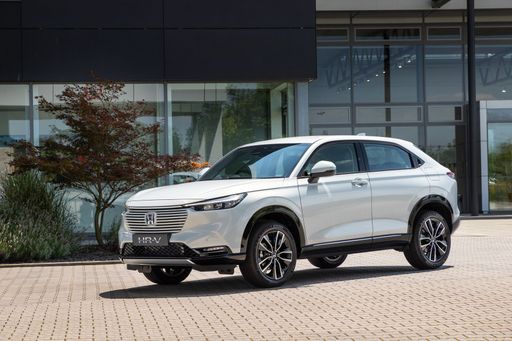 @ hondanews.eu
@ hondanews.eu
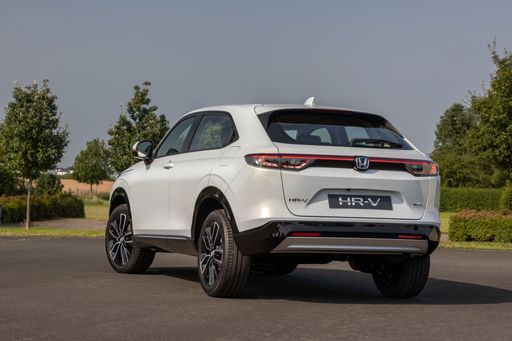 @ hondanews.eu
@ hondanews.eu
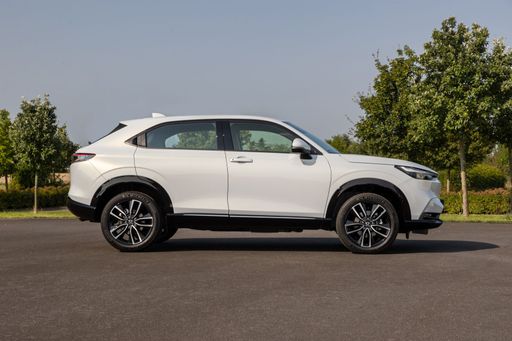 @ hondanews.eu
@ hondanews.eu
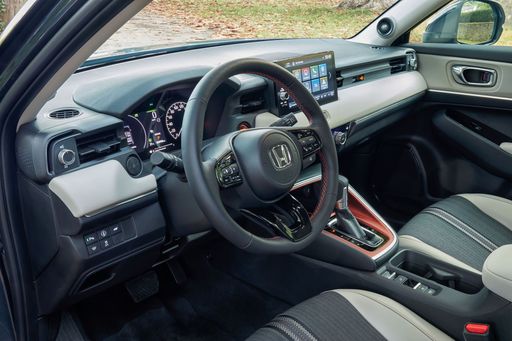 @ hondanews.eu
@ hondanews.eu
Hyundai i20
The Hyundai i20 impresses with its sleek design and modern aesthetics, making it a stylish choice in the compact car segment. Its interior is thoughtfully designed, offering comfort and advanced technology for a pleasurable driving experience. The vehicle also stands out with its efficient performance and agile handling, making city driving a breeze.
details @ hyundai.news
@ hyundai.news
 @ hyundai.news
@ hyundai.news
 @ hyundai.news
@ hyundai.news
 @ hyundai.news
@ hyundai.news
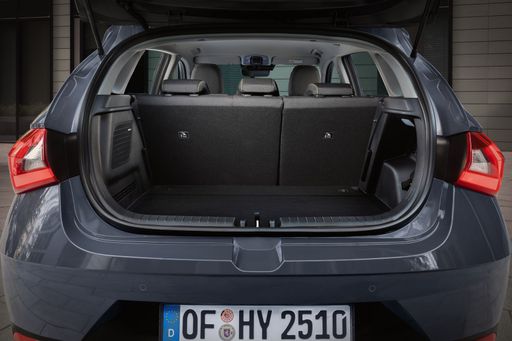 @ hyundai.news
@ hyundai.news

|

|
|
|
|
Costs and Consumption |
|
|---|---|
|
Price
29700 - 35400 £
|
Price
17400 - 24000 £
|
|
Consumption L/100km
5.40 L
|
Consumption L/100km
5.2 - 5.3 L
|
|
Consumption kWh/100km
-
|
Consumption kWh/100km
-
|
|
Electric Range
-
|
Electric Range
-
|
|
Battery Capacity
-
|
Battery Capacity
-
|
|
co2
122 g/km
|
co2
119 - 121 g/km
|
|
Fuel tank capacity
40 L
|
Fuel tank capacity
40 L
|
Dimensions and Body |
|
|---|---|
|
Body Type
SUV
|
Body Type
Hatchback
|
|
Seats
5
|
Seats
5
|
|
Doors
5
|
Doors
5
|
|
Curb weight
1452 kg
|
Curb weight
1088 - 1190 kg
|
|
Trunk capacity
319 L
|
Trunk capacity
352 L
|
|
Length
4355 mm
|
Length
4065 - 4075 mm
|
|
Width
-
|
Width
1775 mm
|
|
Height
1582 mm
|
Height
1450 - 1455 mm
|
|
Max trunk capacity
1289 L
|
Max trunk capacity
1165 L
|
|
Payload
418 kg
|
Payload
450 - 472 kg
|
Engine and Performance |
|
|---|---|
|
Engine Type
Full Hybrid
|
Engine Type
Petrol
|
|
Transmission
Automatic
|
Transmission
Automatic, Manuel
|
|
Transmission Detail
CVT
|
Transmission Detail
Dual-Clutch Automatic, Manual Gearbox
|
|
Drive Type
Front-Wheel Drive
|
Drive Type
Front-Wheel Drive
|
|
Power HP
131 HP
|
Power HP
79 - 100 HP
|
|
Acceleration 0-100km/h
10.6 - 10.8 s
|
Acceleration 0-100km/h
11.1 - 13.7 s
|
|
Max Speed
170 km/h
|
Max Speed
166 - 183 km/h
|
|
Torque
253 Nm
|
Torque
113 - 200 Nm
|
|
Number of Cylinders
4
|
Number of Cylinders
3 - 4
|
|
Power kW
96 kW
|
Power kW
58 - 74 kW
|
|
Engine capacity
1498 cm3
|
Engine capacity
998 - 1197 cm3
|
General |
|
|---|---|
|
Model Year
2025
|
Model Year
2024
|
|
CO2 Efficiency Class
D
|
CO2 Efficiency Class
D
|
|
Brand
Honda
|
Brand
Hyundai
|
What drive types are available for the Honda HR-V?
The Honda HR-V is available as Front-Wheel Drive.
The prices and data displayed are estimates based on German list prices and may vary by country. This information is not legally binding.
